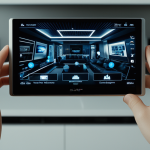Digital Transformation in UK Healthcare
The UK healthcare system is undergoing a significant digital transformation, driven by rising demand for efficiency and improved patient outcomes. A cornerstone of this shift is the widespread adoption of telemedicine, enabling remote consultations that reduce the burden on physical clinics and extend care to underserved areas. Telemedicine’s integration has accelerated, providing patients with convenient access to healthcare professionals without the need for in-person visits.
Alongside telemedicine, the expansion of digital health apps and monitoring tools has empowered patients to actively manage their health. These apps facilitate continuous monitoring of chronic conditions, medication adherence, and lifestyle changes, leading to more personalized care and early intervention when necessary.
In parallel : What Are the Most Common Health Concerns Facing the UK Population Today?
Central to the digital health trend in the UK is the ongoing implementation of electronic health records (EHRs). EHR systems centralize patient information, making data more accessible to clinicians and improving coordination across different care providers. This integration reduces errors, supports real-time decision-making, and forms the backbone of innovative healthcare delivery models. The UK’s commitment to expanding EHR use reflects a strategic priority to modernize healthcare infrastructure and improve service quality through digital means.
The Rise of Artificial Intelligence and Automation
Artificial intelligence (AI) is rapidly becoming a vital component of AI healthcare UK initiatives. Its application spans diagnostics, where AI algorithms analyze medical images to detect diseases with high accuracy, to treatment planning, offering tailored recommendations based on patient data. In patient management, AI supports clinicians by predicting health risks and suggesting proactive interventions.
Also to read : What Are the Latest Innovations in UK Healthcare Policy?
Automation in administrative processes within the NHS has significantly enhanced operational efficiency. Routine tasks like appointment scheduling, billing, and records management are increasingly automated, freeing staff to focus on patient care. This streamlining reduces errors and accelerates service delivery.
Several real-world examples illustrate AI’s impact. Tools analyzing vast sets of medical data improve diagnostic speed and precision, while machine learning models assist in identifying trends previously unnoticed by clinicians. These technologies are providing the NHS with new capabilities to handle complex healthcare demands effectively.
Digital Transformation in UK Healthcare
The digital health trends UK continue to reshape patient care, with telemedicine playing a leading role. The adoption of telemedicine has expanded rapidly, providing remote consultations that increase healthcare accessibility, especially in rural and underserved areas. By allowing patients to consult healthcare professionals without visiting clinics physically, telemedicine reduces wait times and clinic crowding, improving overall service efficiency.
Digital health apps and monitoring tools have grown significantly, enabling continuous patient engagement. These tools support self-management by tracking symptoms, medication adherence, and lifestyle factors. Patients with chronic illnesses benefit greatly, as these apps facilitate early detection of complications and timely interventions.
Implementation of electronic health records (EHRs) is a critical element of the UK’s digital transformation. EHRs consolidate patient information into a centralized system accessible by authorized clinicians, promoting better coordination and continuity of care. Progress in EHR integration ensures data sharing across hospitals, general practitioners, and specialists, minimizing errors and supporting real-time clinical decisions. This comprehensive digital record system enhances patient outcomes by improving accuracy and facilitating seamless information flow throughout the care pathway.
Digital Transformation in UK Healthcare
Digital transformation in UK healthcare continues to accelerate, with digital health trends UK prominently featuring telemedicine, digital apps, and electronic health records (EHRs). The adoption of telemedicine has evolved beyond basic video consultations. It now integrates peripheral devices like digital stethoscopes and wearable sensors, enhancing remote examinations. This enables clinicians to collect vital data during virtual visits, improving diagnostic accuracy without physical presence. The convenience and accessibility of telemedicine help reduce geographic and mobility barriers, making healthcare more equitable.
Expansion of digital health apps and monitoring tools complements telemedicine by supporting ongoing patient engagement. These apps incorporate artificial intelligence to personalize health advice, reminding users about medication and lifestyle adjustments. For chronic disease management, continuous data collection via wearables enables earlier intervention, reducing hospital admissions. This trend reflects a patient-centric model where individuals actively participate in their health management through technology.
The implementation of electronic health records remains a critical foundation for the digital ecosystem. EHR systems now provide interoperability across NHS services, allowing seamless data exchange between primary care, hospitals, and specialists. Such integration improves clinical decisions by providing comprehensive, up-to-date patient histories. Progress includes embedding decision-support tools within EHRs, alerting clinicians about potential drug interactions or necessary follow-ups, further enhancing patient safety. The ongoing refinement of EHR infrastructure supports more efficient workflows and enables advanced analytics to identify population health trends.
Digital Transformation in UK Healthcare
The ongoing digital transformation in UK healthcare is marked by the accelerated adoption of telemedicine, which has evolved to integrate advanced peripheral devices such as wearable sensors and digital stethoscopes. These innovations enhance the quality of remote consultations by enabling clinicians to gather vital signs and other diagnostic data from patients without physical presence, thus overcoming barriers related to geography and mobility.
Simultaneously, the expansion of digital health apps and monitoring tools offers patients continuous engagement in managing their health. These apps utilize artificial intelligence to provide personalized health recommendations, medication reminders, and lifestyle coaching. For chronic disease management, these tools facilitate real-time tracking and early detection of potential complications, which can lead to timely clinical interventions and reduce hospital admissions.
A critical pillar supporting this ecosystem is the implementation and progress of electronic health records (EHRs) across the NHS. Modern EHR systems ensure interoperability across healthcare settings—primary care, specialist services, and hospitals—providing clinicians with comprehensive, up-to-date patient information. Embedded decision-support features within EHRs alert healthcare providers to potential drug interactions, necessary follow-ups, and other safety considerations, improving clinical workflows and patient outcomes. The integration of EHR data also fuels advanced analytics that helps identify population health trends, contributing to the continuous refinement of care strategies under these digital health trends UK.






